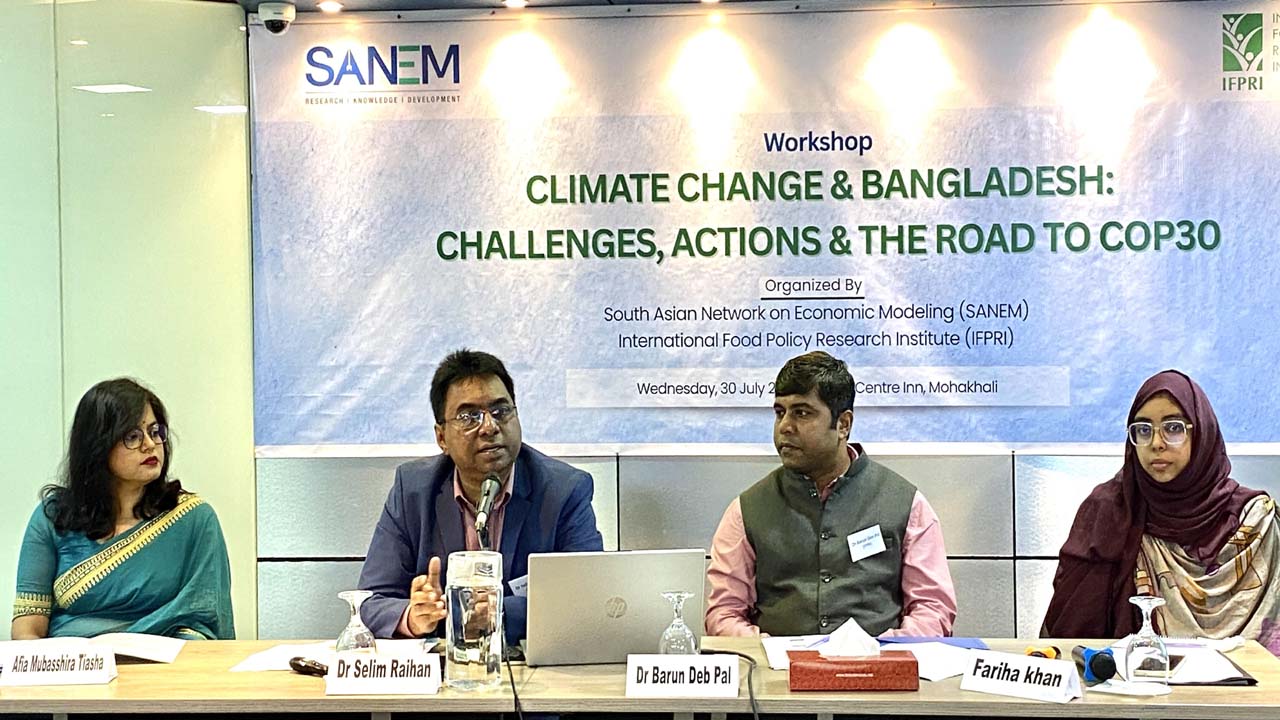Summary
Climate Change and Bangladesh: Challenges, Actions, and the Road to COP30
30 July 2025 | Brac Centre Inn, Dhaka

On 30 July 2025, the South Asian Network on Economic Modeling (SANEM), in collaboration with the International Food Policy Research Institute (IFPRI), organised a policy workshop titled “Climate Change and Bangladesh: Challenges, Actions, and the Road to COP30” at BRAC Centre Inn, Dhaka.
The workshop is part of the ongoing joint study “Towards Inclusive and Climate Resilient Agri-food Systems: Bangladesh’s Path to COP30,” being conducted by SANEM and IFPRI. The study places particular emphasis on envisioning low-carbon, climate-resilient futures for the country’s agriculture, energy, and transport sectors with the aim of generating model-based evidence to help integrate them into Bangladesh’s climate and development policies, particularly as the country prepares for its contribution to COP30.
Addressing Climate-Economy Linkages through Modelling and Dialogue
Preliminary findings were jointly presented by Dr Selim Raihan, Executive Director of SANEM and Professor of Economics at the University of Dhaka, and Dr Barun Deb Pal, Research Coordinator, Foresight and Policy Modeling Unit at IFPRI, Delhi. The presentation highlighted the results of the economy-wide modelling exercise undertaken to evaluate the impact of climate change on employment, economic growth, and poverty in the three sectors.
Participatory Dialogue for Policy Impact
Participants engaged in breakout discussions across four thematic areas:
● Macroeconomic impact
● Agriculture and food systems
● Energy transition
● Sustainable transport
Each group engaged in identifying sectoral challenges, institutional barriers, financing needs, and policy recommendations to inform the third Nationally Determined Contributions (NDC). Key takeaways from the discussions stressed the need for policy coherence, locally grounded resilience planning, and strategic positioning in global climate negotiations.
Expert Insights on Equity, Governance, and Adaptation
The workshop featured critical reflections from renowned experts including Dr Ainun Nishat, Professor Emeritus, BRAC University, Dr Md. Shamsul Hoque, Professor, Civil Engineering, BUET, Dr M. Asaduzzaman, Environment and Climate Expert and Former Research Director, BIDS
Their inputs highlighted the importance of equity, institutional coordination, and realistic goal-setting in climate policy. Discussions emphasized aligning renewable energy targets, mainstreaming climate risk into transport planning, and ensuring inclusive adaptation strategies that protect vulnerable populations.
Advancing the Climate Policy Agenda
The event brought together economists, academics, policymakers, and development practitioners to discuss how Bangladesh can align its national development goals with global climate commitments ahead of COP30. As part of the initiative, four sectoral policy briefs were released to stimulate policy dialogue and support evidence-informed decision-making on issues of climate finance, technology transfer, and governance mechanisms.
For more updates on SANEM’s work on climate policy and sustainability, stay connected through our website and social media platforms.
